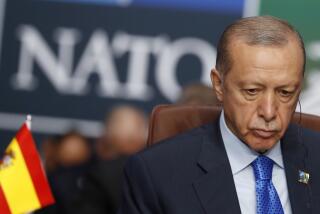Turkish Military Backs Opening Bases to U.S. Troops
- Share via
ANKARA, Turkey — The Turkish armed forces Wednesday firmly endorsed a U.S. proposal to send combat troops through Turkey for an assault on Iraq, adding to pressure on parliament to reconsider its refusal to authorize the deployment.
The support of the military was seen as an important boost to U.S. war plans, but the top American commander, Gen. Tommy Franks, was huddling Wednesday with President Bush in Washington and making it clear that his troops could conquer Iraq with or without Turkey’s help.
That was exactly the rationale used by Gen. Hilmi Ozkok, the Turkish military’s chief of staff, in calling on his country’s parliament to reverse its decision.
Ozkok said Wednesday that although Turkey opposes a war, it is incapable of preventing one. The country, he added, would be better off cooperating with the Bush administration, taking a promised U.S. reward of $15 billion to cover wartime losses and assuring itself of influence in a postwar Iraq.
“Our choice is not between good and bad. Our choice is between bad and worse,” the general said in a televised statement on behalf of the military. “If we do not participate, we will suffer the same harm from war. However, our losses will not ever be compensated, and we will not ever have a say in the aftermath.”
Turkey’s armed forces, which often dictate policy behind the scenes, remained neutral during the national debate leading up to parliament’s surprise rejection Saturday. Some lawmakers had equated the military’s silence with opposition to the plan, making them balk at the proposed deployment of 62,000 U.S. troops.
Ozkok said the armed forces’ low profile was misunderstood. He said that senior commanders joined the government in supporting the measure but felt that pressure on lawmakers before the vote “would not have been democratic.”
By speaking out Wednesday, the general appeared to be lobbying for a new vote in parliament before it’s too late.
The Pentagon wants Turkey to serve as the northern front of a two-pronged attack on Iraq, with other forces closing in from Kuwait in the south.
But Secretary of State Colin L. Powell said Tuesday that the U.S. would make plans to wage war without Turkey’s help if the Turkish parliament didn’t reverse itself “in the next several days.”
Dengir Mir Mehmet Firat of the ruling Justice and Development Party said a new deployment request would go to parliament “as soon as possible.” Many lawmakers doubt that will happen before late next week, but Firat said that “conditions are changing fast” and that support for a reversal is growing.
Although a huge majority of Turks oppose an assault on Iraq, “people are belatedly waking up to reality -- how hard it will be economically if we spurn the United States -- and so is the army,” said Dogu Ergil, an Ankara University professor of international relations. “Now that the army has taken a stand, it will be easier for parliament to vote ‘yes’ without feeling isolated.”
As the debate continued in Turkey, Franks discussed the Turkish situation and the broader war plan with Bush and Defense Secretary Donald H. Rumsfeld.
A senior defense official said Franks presented the president with a series of military options and timetables. Meanwhile, the Pentagon refined plans for putting U.S. ground forces into northern Iraq without moving them through Turkey.
“If the president of the United States decides to undertake action, we are in a position to provide a military option,” Franks told a news conference.
A northern front is considered essential to the military’s preferred war plan, which calls for overwhelming Iraqi President Saddam Hussein with simultaneous air, land and ground attacks from many directions. The plan was to deploy the 4th Armored Infantry Division from Turkish soil.
One option under discussion Wednesday was airlifting the entire division into northern Iraq from Kuwait. But that would require an elaborate air bridge through Iraqi airspace to move the division’s heavy equipment, relying on Air Force C-17 cargo planes to fly tanks and other equipment into ethnic Kurdish-controlled areas in the north.
The unarmed C-17s would require escorts of fighter planes. And each C-17 could carry only one tank, making the process time-consuming. Just getting the division into Kuwait would take two weeks, a senior military official said.
Franks and his war planners could also decide not to use the 4th Infantry Division and instead helicopter the Army’s 101st Airborne Division into northern Iraq, military officials said.
Meanwhile, dozens of ships bearing the 4th Infantry Division’s tanks and other equipment continued to float off Turkish shores in the Mediterranean, awaiting orders on where to go. Two naval aircraft carrier battle groups with dozens of ships also remained in the Mediterranean, where they were to be launching pads for fighter craft that would fly over Turkey into Iraq.
If Turkey doesn’t permit such overflights, the battle groups are likely to be moved through the Suez Canal and into the Red Sea, where fighter craft could fly into Iraq without using Turkish airspace.
*
Boudreaux reported from Ankara and Schrader from Washington.
More to Read
Sign up for Essential California
The most important California stories and recommendations in your inbox every morning.
You may occasionally receive promotional content from the Los Angeles Times.













